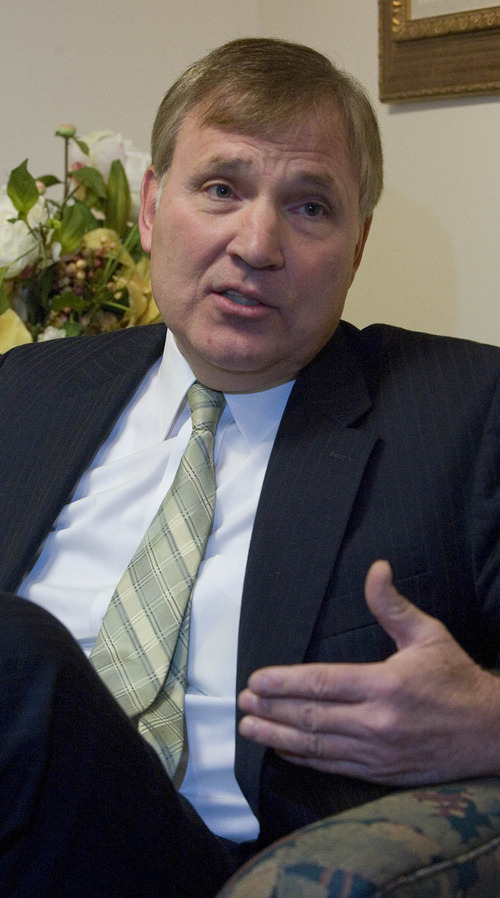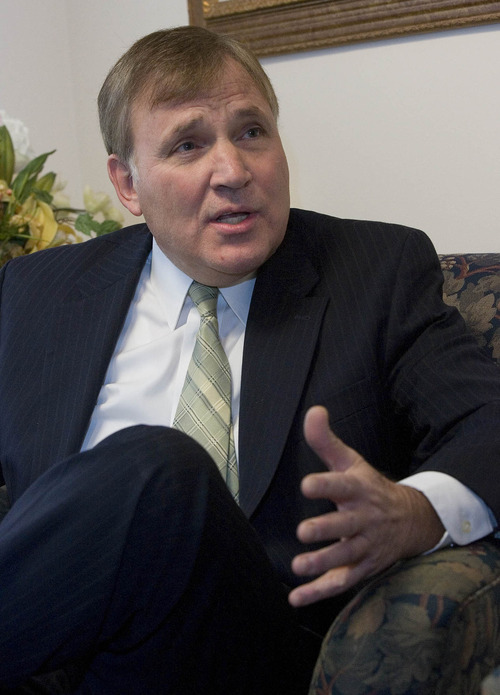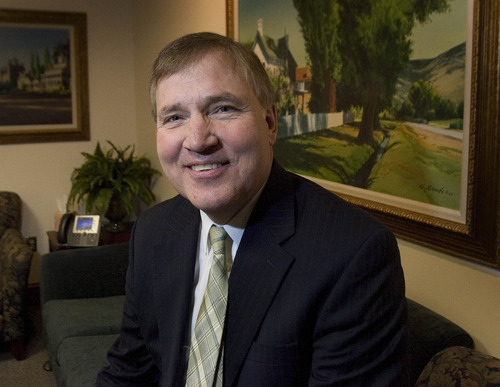This is an archived article that was published on sltrib.com in 2011, and information in the article may be outdated. It is provided only for personal research purposes and may not be reprinted.
More than three years after a Utah judge ruled he had failed to protect his parental rights, Rob Manzanares is still fighting for custody of his now nearly four-year-old daughter.
He has met her just once. The girl's adoptive parents brought her to a court hearing in December 2009 and, before it began, Manzanares stood in a tiny meeting room and held his daughter for the first time.
"I didn't want to cry too much," he said. "I didn't want to scare my daughter."
At that meeting, Manzanares said he was offered a deal: Drop the legal fight and "there's an opportunity to have visitation." He refused and, more than a year after a hearing before the Utah Supreme Court, is still waiting a decision in a case that highlights how competing interests of unwed fathers and social policy can complicate adoption.
"It is my flesh and blood, she's my child," said Manzanares, 34, of Colorado. "I should have a right to raise my child first, over anybody."
Related story • Stopping an adoption: In Utah, fathers rarely win • http://bit.ly/uT51Tc
Related story • Would-be Utah dad says misplaced trust cost him his son • http://bit.ly/tFaA2J
That is not the way the law sees it, as a Utah Supreme Court justice argued bluntly in 2007:Men who father a child outside of marriage must take steps to assert a legal relationship to a child or "risk losing it altogether."
That "biology plus" view is enshrined in a handful of U.S. Supreme Court decisions, as well as adoption laws in Utah and numerous states. Utah's adoption law explicitly puts men on notice that sex outside of marriage may result in a pregnancy and an adoption. It is up to him alone, the law says, to protect any claim to a child born in those circumstances.
Perhaps it is due to a lack of awareness, financial resources or simple disinterest, but few do. Some men who have tried to follow Utah law say the state purposefully makes it difficult to comply.
"It is these rare cases where you have a mom who, for whatever reason, wants to cut dad out of the decision making and a very active dad who wants to participate that makes the news and makes the law," said Lisa Kelly, a University of Washington Law School professor and co-author of an adoption law textbook.
They may be rare, but such cases have surfaced with surprising frequency recently in Utah, where marriage is widely seen as a sacred institution and, in adoption cases, rights of unmarried fathers are narrow.
Unwed fathers had no custody rights at all until 1970, when the Utah Supreme Court found that holding a man financially responsible for his illegitimate offspring also entitled him to "custody and control as against all but the mother."
Though just 10.7 percent of all births in the U.S. that year were to unmarried women, a seismic cultural change regarding illegitimacy was already in motion. As more women opted to keep their babies, states began to lean more heavily on unwed fathers to provide financial support for those offspring. At the same time, it left them out of most adoption decisions.
Then came a ground-breaking 1972 U.S. Supreme Court finding that a state could not remove three children from their father's care after their mother's death without a hearing simply because the parents, together for 18 years, had never married. In subsequent rulings, the court recognized Constitutional rights of unwed fathers who have a substantial relationship with their children but held that, sans a legal or substantial relationship, states could require such fathers to take steps, such as signing with a registry, to be entitled to notice of proceedings.
Utah established such a requirement in 1975 and strengthened it two decades later in sweeping revisions to the state's adoption law. Reflecting the predominately Mormon Legislature's view, one lawmaker observed during debate that "it is wrong to have children outside of marriage," according to a 2009 article in the Journal of Law & Family Studies. A handwritten note on drafting instructions for the legislation read: "Change adoption law as we know it and test the bounds of Constitutional protection for biological fathers."
As revised in 1995, the law says fraud by the mother — hiding a pregnancy or a plan to give birth in or pursue adoption in Utah — does not excuse an unwed father's failure to act. However, it allows an out-of-state father to argue he had no prior knowledge his child would be born in or adopted in Utah, acted within 20 days of discovering the fact to comply with state law and previously protected his rights in his own state.
In Manzanares' case, a Utah judge found Carie Terry, his daughter's mother, deliberately deceived him and concealed information from judges in Utah and Colorado. Despite that, Manzanares' attempt to derail the adoption failed because, by his own admission, he feared Terry might give birth in Utah but failed to take timely action here, the judge said.
"We believe the district court ultimately came to the correct decision," said attorney David Hardy, who represented Terry at a late stage in the case.
Attorney David McConkie, who helped craft the legislation, calls Utah's strict law a model for the nation.
The law requires a two-step process that includes filing with the registry and initiating a paternity action in court, along with submission of a detailed child care plan — though there's no guidance on how to satisfy that mandate. One father who vowed to "assume all financial responsibilities," for example, fell short of the mark. The Utah Court of Appeals ruled he had failed to specifically say how he'd earn that money or "identify who will care for the child while he is working to earn that income."
Utah's law is aimed at balancing the interests of all parties — the state, the mother, the biological father, the infant, the adoptive parents, said McConkie, now manager of children's services at LDS Family Services, which arranges adoptions through its 62 offices in the U.S. and abroad and is owned by The Church of Jesus Christ of Latter-day Saints.
"There's going to be cases where it doesn't work very well, but you can't craft a law around a specific case," said McConkie. "You've got to craft a law that meets society's interests and the parties' interests more generally."
What interests? Privacy, speedily finding homes for infants, ensuring those placements are final, and, most important of all, determining what's best for a child, he said. Yes, interests sometimes conflict, he said.
"The mother has one way that she would like to go and the father has a way that he would like to go," McConkie said. "And that's a huge issue in this type of legislation — what do you do with this conflict of interest?"
Terry, for instance, testified in a Utah court hearing that she repeatedly told Manzanares that, despite his objections, she thought their child needed the "two-parent home" that adoption would provide "versus a hostile, stressful, anger situation."
Critics such as Erik T. Smith of Ohio, a nationally recognized expert in putative father issues, say Utah's answer has been to make the "window of opportunity as small as it can be" for unwed fathers to assert rights. But an even bigger problem, according to Smith, is most unmarried men don't have the slightest inkling what the law requires — and McConkie doesn't disagree with him.
At present, there is no information about the registry on the websites of the Utah Department of Health or Office of Vital Statistics, the state division charged with maintaining the registry, and the office won't mail forms to fathers or their representatives, requiring them instead to appear in person.
"The thing I think is the hardest about Utah law, and I'm sensitive to this, is that fathers don't know about it," said McConkie. "I don't know how you solve that problem, unless it's advertised more."
Another issue, as numerous unmarried fathers who don't live in Utah have discovered: a judge in his home state may make a paternity finding but then be unable to address custody because the child resides and is part of an adoption proceeding here. As of 2010, Utah law specifically says a paternity order doesn't entitle an out-of-state father to participate in such hearings, a change that came after several rulings in Manzanares' tangled case.
Manzanares filed a paternity action in Colorado on Jan. 16, 2008, more than a month before his daughter's birth. On Feb. 20, 2008, the day a hearing was set on the matter, Terry called the court and said she was unable to attend because she was in Utah visiting her sick father. What Terry didn't disclose is that she'd given birth prematurely in Utah three days earlier and that very morning had signed papers before a Utah judge relinquishing the baby.
Nine days later, after the child's birth was revealed, the Colorado court granted paternity, rights and responsibility for the infant to Manzanares. In July, a different Utah judge ordered the infant turned over to Manzanares, only to reverse the decision a week later and order another hearing. While the judge later vacated the court order approving Terry's consent to the adoption, he ruled in August 2009 that Manzanares had not adequately protected his parental rights here, triggering his appeal.
Such lengthy court battles are typical and, some say, may erect a final, insurmountable hurdle for unwed fathers: If a father is found to have preserved his rights, a court then weighs his parental fitness and the child's best interests, including the emotional and psychological impact of disrupting bonds between a child and the only parents he or she has ever known — although the Utah Supreme Court said in a 2007 decision such bonds are "legally irrelevant."
The slow process prompted the author of a 2010 article in the Journal of Law and Family Studies to urge lawmakers to expedite adoption hearings, as done in child welfare cases.
Utah attorney Phil Lowry, who represented a North Carolina father in his failed custody bid, doesn't expect solutions to such problems any time soon. Unwed fathers are an "under-represented group of individuals. And there are going to continue be problems for them and it is only going to get more aggravated as marriage becomes more fragmented," he said. —
Editor's note
This is the second of four stories examining adoption in the context of unmarried fathers' rights under Utah law.
Coming Tuesday • The as yet untold case of Jake Strickland, whose story painfully illustrates there is no defense in Utah law for fathers who may be misled by a mother or agency. —
By the numbers: A look at 2010
52,164 • Utah Births
9,891 • Utah births to unmarried women
41 percent • U.S. births to unmarried women
19 percent • Utah births to unmarried women
30 • Filings in Utah's putative father registry
1.3 percent • Estimate of unmarried women who choose adoption, U.S.
Source: Utah Office of Vital Statistics; U.S. Census; Centers for Disease Control and Prevention; Salt Lake Tribune reports —
LDS Family Services
The agency, a party in at least 10 of the 27 high court decisions reviewed by The Salt Lake Tribune, is owned by The Church of Jesus Christ of Latter-day Saints. The church urges unmarried women to pursue adoption because they are generally unable to provide a stable, nurturing environment and because "unwed parents are not able to provide the blessings of the sealing covenant." The faith believes that covenant ties a family together on earth and in heaven. Excerpts from Utah court rulings
"It is conceivable, however, that a situation may arise when it is impossible for the father to file the required notice of paternity prior to the statutory bar, through no fault of his own. Due process requires that he be permitted to show that he was not afforded a reasonable opportunity to comply with the statute."
Utah Supreme Court, 1980
"Those who conceive children outside the bonds of marriage may be loving parents, but experience teaches that the number of illegitimate children born each year contribute disproportionately to many of the serious social problems with which society must cope."
Utah Supreme Court, 1984
Utah's law "was not created to encourage a 'race' for placement to cut off the rights of fathers who are identified and present, but who are hours late in registering their claims because of ignorance of their statutory obligation."
Utah Supreme Court dissent, 1984
[The statute] "does not distinguish between fathers in a monogamous relationship who are led to believe mother, father, and baby will form a family unit, and ne'er-do-wells who have nothing to do with the mother after a casual fling that culminates in conception."
Utah Court of Appeals dissent, 2002
"We also hold that the phone call made to Mr. O'Dea in which Ms. Olea stated 'I am in Utah' gave him adequate inquiry notice that a qualifying circumstance existed" and he needed to comply with Utah law.
Utah Supreme Court, 2009
"Because the Natural Father failed to file his paternity action within the time required by New Mexico law, he did not establish his status as an acknowledged father, and the later paternity order was of no force or effect."
Utah Supreme Court, 2009







